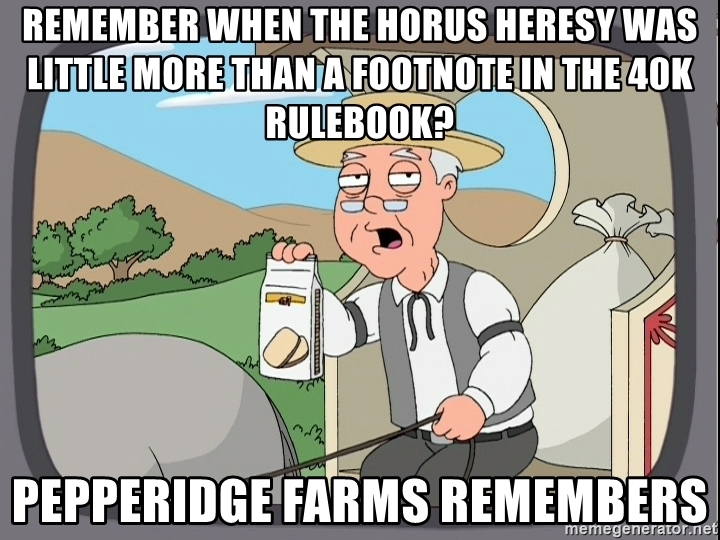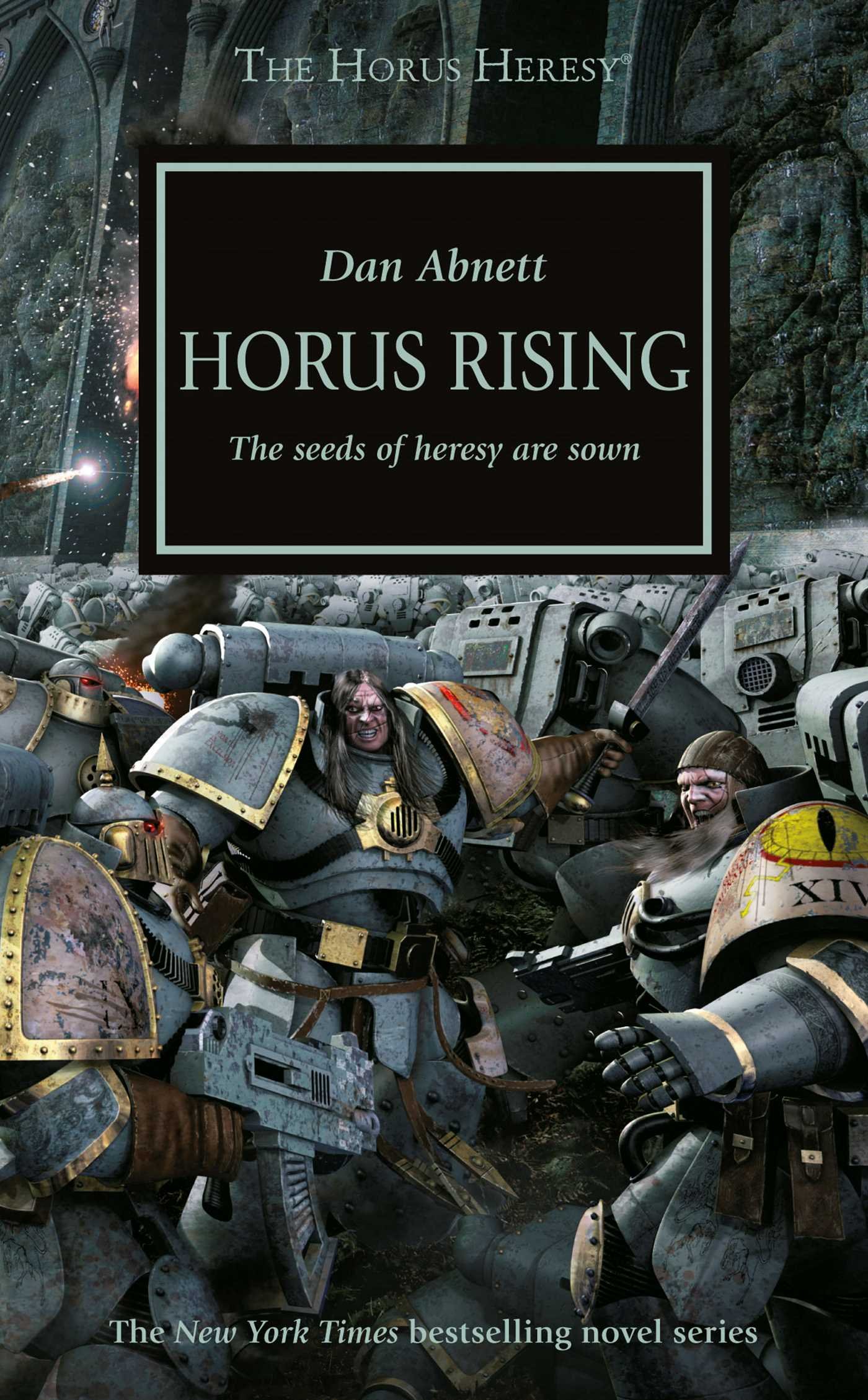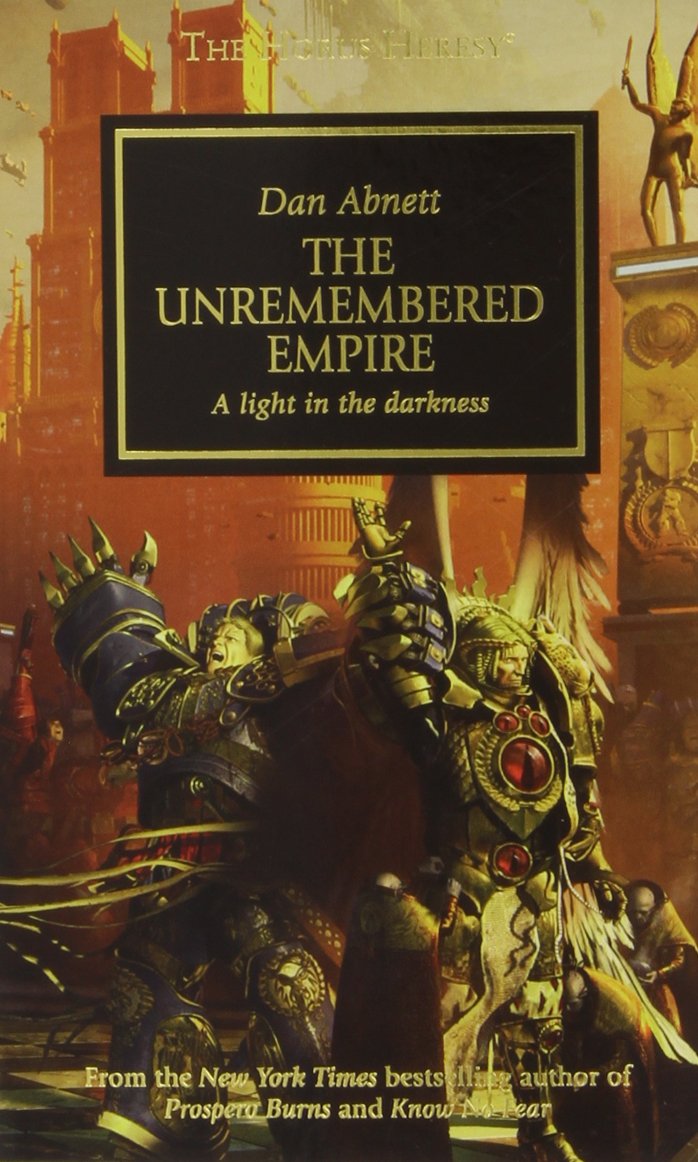Update: This article has been updated after reading Dark Imperium: Godblight, by Guy Haley.
I have been outspoken on my distaste for the Horus Heresy. What started as an intriguing fleshing out of established lore and history has quickly become a bogged down slog through minutia. When examined in pieces, there are some outstanding books within the series. But on the whole, I am entirely over it. Recently, one of our Patrons asked me an interesting question: What are the required readings for Horus Heresy? Specifically, what books would one need to read to start the Siege of Terra series? As such I present my Hater’s Guide to the Horus Heresy™.

Now obviously this is wholly in my humble opinion. I also want to say that there are some fantastic books that I’ve left off this list. It’s nothing against the authors or the books themselves, but rather the story as a whole. For instance, I loved Guy Haley’s Pharos, but it is hardly required reading for the Heresy. In my mind, the most important books deal with why the traitor primarchs did what they did. It’s somewhat interesting to know why some loyalists stayed loyal to the Emperor, but those stories just don’t have the gravitas of some of the falls. Again, this is just, like, my opinion, man.

My Objections
First, let me state my biggest frustrations with the Horus Heresy: the disparate, bipolar approach to some of the primarchs. In some books, Perturabo is a cold, mercurial man who cares for his men. In other stories he is a callous, bitter man who cares for no one and nothing. On one hand, it’s fine and makes sense because every author has their own interpretation of the character. On the other, it forces some fans to create their own head canon, disavowing certain books/stories to keep this true. Additionally, as the books dive deeper into the minutia, it renders certain stories moot, or makes them nonsensical. Certain primarchs, for instance, are renowned for not being at an event, but now were secretly at an event. Oooooooh. That’s some Star Wars EU-level of frustration.
And even if you can handle the double-secret existences and appearances, do you really need to read yet another book about Horus consorting with daemons? Does the world really need another book where the Dark Angels sort through their lies, but from a different person’s point of view? If I read another story about Angron forcing the nails upon his sons, I’m going to puke.

The Official Hater’s Guide to the Horus Heresy List
- Horus Rising — Gee, what a surprise. Look, not only is Dan Abnett’s introductory novel one of the best in the Horus Heresy, it’s one of the best in the entire Black Library catalog. This book sets the stage for multiple reasons, and in multiple ways.
- False Gods — Also, probably not much of a surprise. You need to understand how Horus turns, and what exactly Erebus’s role is in this. Graham McNeill hastens the events in this book, and it helps establish many important who, what, when, where, why questions.
- Galaxy in Flames — Istvaan III is, like, important to the Horus Heresy. This book is not the strongest in the HH offerings, but it does offer some very important groundwork. Not reading this one would be a mistake.
- The Flight of the Eisenstein — In addition to being a very good book, this book is essential in helping you understand who Nathaniel Garro is. It also sets up the general mood for the remaining Heresy books, I think.
- Fulgrim — Oh man, what can be said about this book? Graham McNeill perfectly captures the tragedy at the root of Fulgrim’s story. Additionally, this book above all else might be the best example of how insidious chaos can be. This is part 1 of mandatory Fulgrim books.
- Legion — I have a lot of mixed feelings about this book. On one hand, it introduces what I will passionately argue is one of the most problematic characters/concepts in the entire Warhammer universe. On the other, this book is so vital to understanding why the Alpha Legion is the way that they are. When this book came out, it was ground-breaking, and as Keri recently discovered, it holds up.
- Mechanicum — Now we start jumping around a bit. This book is pivotal in understanding the schism within the Mechanicus, and what the main issue is between the two sides. It also introduces one of the neatest concepts in the Warhammer universe.
- Fallen Angels — Okay, this might be a bit of a hot take. There are like 1,001* books on the Dark Angels throughout the Horus Heresy series. I personally think there are only two† that you need to read. This is one of them because it sets the stage for why the Dark Angels are the hot mess complicated group that they are.

The Dark Angels, in a nutshell. But a loveable H.A.M., if you ask Keri. - A Thousand Sons — Wanna know what happens when you trust in sorcery? Magnus’s tale is eloquently and tragically laid bare in this book which is pivotal to understanding the first half of Magnus’s road to betrayal.
- Prospero Burns — Now we start to get out of sync a little. Yes, this book comes after the next book I recommend reading, but it’s silly to NOT jump straight into this one. Russ’s part in Magnus’s fall is detailed through the eyes of a remembrancer. But nothing is as it seems in this book.
- The First Heretic — Hey kids, wanna really hate Lorgar, Erebus, and Kor Phaeron? This is the book for you. Some people argue you should read this book first since it technically kickstarts the heresy. I don’t have a strong opinion on that, believe it or not. All I can say is that this book is not only good, it has a twist in it that is worthy of a chef’s kiss. And one that Saturnine attempts to throw out the window.
- Angel Exterminatus — This book is important for a few reasons. One, Fulgrim’s ascent to daemonhood. Two, it explains why Perturabo decides to side with Horus. Additionally McNeill introduces the Fab Five, who are important in The Sons of Selenar.
- Betrayer — You guys. Not only does this book introduce the Baddest Bitch in the Galaxy, Lotarra Serrin, this will really help you understand Angron. Super important to understanding what this guy is now, and how he behaves. You think you know, and you kind of do, but this really lays it out in a beautiful way.
- The Master of Mankind — The title alone should probably explain why this book is important, but just in case, here we are. Lot of interesting conversations, one of the sickest burns, and some heartbreaking scenes.
- The Unremembered Empire — This book is not only fun, it does answer a few questions that you may have later. Specifically what the Lion, Sanguinius, Roboute, and Konrad were all up to. If you don’t finish this book having a strange love for Konrad “Vampire Lord” Curze, I don’t know what to tell you. Additionally, in light of Guy Haley’s conclusion of the Dark Imperium series, I have a feeling this book just got SUPER RELEVANT.

Fifteen Books
And that’s really it. These are the only necessary books to understand the Horus Heresy. Again, there are some great short stories and some great books in here that I’m leaving out. For hardcore Heresy fans, those could be must-reads. If you find yourself getting bored of yet another Heresy tale, or if you find yourself hating how your favorite primarch has been treated in a book, this list is for you.
Additional Reading to the Horus Heresy Guide
What? You want more Horus Heresy? Okay, fine, these ones are also pretty darn good and semi-important.
- The Buried Dagger — In case you were wondering how the Mortarion from the Council of Nikea becomes the poster child for psyker nonsense, this book’s for you. It is a very good book that details exactly how and why Mortarion and his boys fall to Nurgle. It will, however, make you wonder why Typhus still walks amongst the legion in the 42nd millennium.
- Deliverance Lost — Wanna know about that dark spot on Corax’s record that we just don’t talk about? This book explains why he did what he did, and why didn’t work out as well as he hoped. Despite my dislike of certain concepts in the Heresy, this book executes it well.
- Know No Fear — Do you like Roboute Guilliman? Do you want to see him be a complete and total badass? This book’s your huckleberry. While not necessarily vital to the whole Horus Heresy plot, it is a neat look into Lorgar vs. Guilliman.
- Pharos — The sequel to The Unremembered Empire, Pharos falls under what I call “pure fun.” It really doesn’t bring much to the Heresy on the whole, but it does pay off on a seed planted in the previous book. And it stars my favorite character of the Heresy, Warsmith Dantioch. Oh, and uh, an event in it is sort of relevant to the 40k universe…

This is hilarious after you read the book. Or if you just have a certain type of humor. - Age of Darkness — This is by far and away my favorite of the short story collections. Again, it features Warsmith Dantioch in arguably the funnest story of the Heresy. Additionally it’s clearly a very inspired collection. Unlike some of the others which can be hit or miss.
- Konrad Kurze: The Night Haunter — OK, this is technically in the Primarch series, but it’s the only book that really gives you an understanding‡ of why Kurze is the way he is.
*Remember that one time I talked about the abundance of minutia? Yeah, the Dark Angels might be the #1 offender of that.
†Read Luther. No, seriously, READ IT.
‡No, Vulkan Lives is not on this list. I have a lot of complex feelings on this book.
Thanks, Jen! I’m still going to read all the HH books, but at least I know when I can start injecting some Siege of Terra books inbetween.